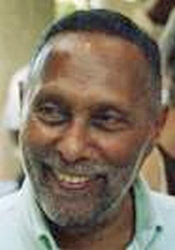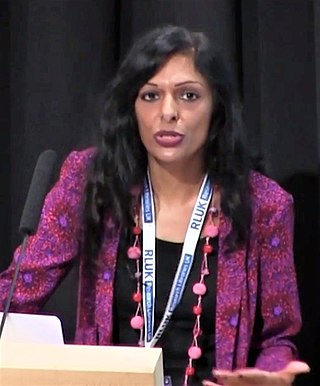Related Research Articles
William Julius Wilson is an American sociologist, a professor at Harvard University, and an author of works on urban sociology, race, and class issues. Laureate of the National Medal of Science, he served as the 80th President of the American Sociological Association, was a member of numerous national boards and commissions. He identified the importance of neighborhood effects and demonstrated how limited employment opportunities and weakened institutional resources exacerbated poverty within American inner-city neighborhoods.

Stuart Henry McPhail Hall was a Jamaican-born British Marxist sociologist, cultural theorist, and political activist. Hall — along with Richard Hoggart and Raymond Williams — was one of the founding figures of the school of thought known as British Cultural Studies or the Birmingham School of Cultural Studies.
David Gauntlett is a British sociologist and media theorist, and the author of several books including Making is Connecting.
The Centre for Contemporary Cultural Studies (CCCS) was a research centre at the University of Birmingham, England. It was founded in 1964 by Stuart Hall and Richard Hoggart, its first director. From 1964 to 2002, it played a critical role in developing the field of cultural studies.
Critical race theory (CRT) is an interdisciplinary academic field focused on the relationships between social conceptions of race and ethnicity, social and political laws, and media. CRT also considers racism to be systemic in various laws and rules, and not only based on individuals' prejudices. The word critical in the name is an academic reference to critical theory rather than criticizing or blaming individuals.
Paul Willis is a British social scientist known for his work in sociology and cultural studies. Paul Willis' work is widely read in the fields of sociology, anthropology, and education, his work emphasizing consumer culture, socialization, music, and popular culture. He was born in Wolverhampton and received his education at the University of Cambridge and at the University of Birmingham. He worked at Centre for Contemporary Cultural Studies and subsequently at the University of Wolverhampton. He was a Professor of Social/Cultural Ethnography at Keele University. In the autumn of 2010, he left Keele University and is now a professor at Princeton University.

"Mainstream Science on Intelligence" was a public statement issued by a group of researchers led by psychologist Linda Gottfredson. It was published originally in The Wall Street Journal on December 13, 1994, as a response to criticism of the book The Bell Curve by Richard Herrnstein and Charles Murray, which appeared earlier the same year. The statement defended Herrnstein and Murray's controversial claims about race and intelligence, including the claim that average intelligence quotient (IQ) differences between racial and ethnic groups may be at least partly genetic in origin. This view is now considered discredited by mainstream science.

Joe Richard Feagin is an American sociologist and social theorist who has conducted extensive research on racial and gender issues in the United States. He is currently the Ella C. McFadden Distinguished Professor at Texas A&M University. Feagin has previously taught at the University of Massachusetts, Boston, University of California, Riverside, University of Texas at Austin, and the University of Florida.
Allan Luke is an educator, researcher, and theorist studying literacy, multiliteracies, applied linguistics, and educational sociology and policy. Luke has written or edited 17 books and more than 250 articles and book chapters. Luke, with Peter Freebody, originated the Four Resources Model of literacy in the 1990s. Part of the New London Group, he was coauthor of the "Pedagogy of Multiliteracies: Designing Social Futures" published in the Harvard Educational Review (1996). He is Emeritus Professor at Queensland University of Technology in Brisbane, Australia and adjunct professor at Werklund School of Education, University of Calgary, Canada.
Joseph O. Jewell is a professor of Black Studies and Department Head at the University of Illinois Chicago (UIC). Prior to his time at UIC, Jewell was an associate professor of African American Studies and Department Chair at Loyola Marymount University. At Loyola Marymount, Jewell came to the African American Studies Department following the lead of John Davis and Ronald Barrett. Jewell also held an appointment at Texas A&M University as an Associate Professor of Sociology. He also served as interim director of Texas A&M's Race and Ethnic Studies Institute. His research has included examining race and class in social and reform movements of the nineteenth and twentieth centuries. He published Race, Social Reform and the Making of a Middle Class: The American Missionary Association in Atlanta, 1870–1900,. He is also the co-author of "The Mis-Education of Black America: Black Education Since An American Dillemma" with Walter R. Allen in An American Dilemma Revisited: Race Relations in A Changing World.
Annette Patricia Lareau is a sociologist working at the University of Pennsylvania.
Les Back is a professor of sociology at the University of Glasgow and former Director of the Centre for Urban and Community Research at Goldsmiths, University of London. He is a researcher and author of books and academic studies on topics including racism, music and urban cultures.
Laura E. Gómez is a professor at the School of Law at the University of California, Los Angeles where she also holds appointments in Sociology and the Department of Chicana & Chicano Studies and Central American Studies.
Michael Parker Banton CMG, FRAI was a British social scientist, known primarily for his publications on racial and ethnic relations. He was also the first editor of Sociology (1966-1969).
David S. Wiley is professor of sociology at Michigan State University (MSU).

The sociology of race and ethnic relations is the study of social, political, and economic relations between races and ethnicities at all levels of society. This area encompasses the study of systemic racism, like residential segregation and other complex social processes between different racial and ethnic groups.
Cultural studies is a politically engaged postdisciplinary academic field that explores the dynamics of especially contemporary culture and its social and historical foundations. Cultural studies researchers generally investigate how cultural practices relate to wider systems of power associated with, or operating through, social phenomena. These include ideology, class structures, national formations, ethnicity, sexual orientation, gender, and generation. Employing cultural analysis, cultural studies views cultures not as fixed, bounded, stable, and discrete entities, but rather as constantly interacting and changing sets of practices and processes. The field of cultural studies encompasses a range of theoretical and methodological perspectives and practices. Although distinct from the discipline of cultural anthropology and the interdisciplinary field of ethnic studies, cultural studies draws upon and has contributed to each of these fields.
Kwesi Kwaa Prah is an author, public speaker, and a Sociology professor, who was born in Ghana and has been based in southern Africa since the 1980s. He is the author of several books, including Beyond The Color Line (1997). He has also published many articles revolving around the topics of Africa's history and what is to come in Africa's future, as well as speaking and writing on issues such as the education system and social reforms. He is vocal about the race issues in society, speaking publicly and challenging government actions. He is the founder and Director of the Centre for Advanced Studies of African Society (CASAS). He has worked in a number of universities in Africa, Europe and Asia, researching and teaching Sociology and Anthropology.
Race Ethnicity and Education is a biannual peer-reviewed academic journal covering ethnic studies as it pertains to education. It was established in 1998 and is published by Routledge. It is supported by the American Educational Research Association's Critical Examination of Race, Ethnicity, Class and Gender in Education Special Interest Group, as well as by the British Educational Research Association's ’Race’ Ethnicity and Education Special Interest Group. The editor-in-chief is David Gillborn. According to the Journal Citation Reports, the journal has a 2016 impact factor of 1.257.

Kalwant Bhopal is Professor of Education and Social Justice and Director of the Centre for Research in Race & Education at the University of Birmingham. Her work explores the achievements and experiences of minority ethnic groups in education with a focus on how processes of racism, exclusion and marginalisation operate in predominantly White spaces.
References
- ↑ Harrison, Angela (2013-02-21). "Doreen Lawrence launches race unit". BBC News. Retrieved 2017-10-15.
- 1 2 "David Gillborn". University of Birmingham.
- ↑ "Professor David Gillborn" (PDF).